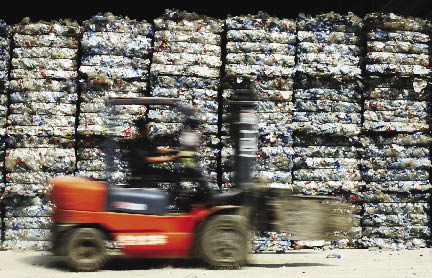| Waste Not, Want Not
By staff reporter ZHU HONG
The accelerated urbanization of China comes with its attendant headaches. One of the undesirable outgrowths is a surge in urban garbage, which is approaching the maximum municipal limits that some areas can accommodate, yet still continues to pile up year after year. Landfills are consuming precious land resources on the perimeters of Chinese cities, and what’s more, they contaminate the environment. Well aware of the environmental and economic repercussions of waste treatment, Chinese authorities are working feverishly on several environmental battlefronts, including curbing the sources of waste, increasing support to recycling systems, and improving treatment facilities with new and sophisticated technologies.
 |
|
Municipal solid waste waiting to be sorted out at the Resources Recycling Center of Haidian District, Beijing. |
LIKE other cities in China, Beijing is suffocating under the solid waste its residents produce. After decades of racing to enlarge its trash treatment capacity, it now turns to the root of the problem for a longer term solution – controlling the source of waste in the first place. This April, the municipal government designated every Thursday Garbage Reduction Day to raise awareness and promote participation among local citizenry.
Landfill sites first appeared in Beijing in 1994, and became the approach of choice for waste management. By the end of 2008, solid waste was amassing at 18,400 tons daily and rising at an annual rate of eight percent. At this rate, Beijing will run out of landfill space in four years.
It turns out that cities can’t win this game by responding only when mountains of garbage are already there. Beijing is taking proactive measures. “The hope lies in cutting back the output,” said Wang Weiping, an engineer with the Beijing Municipal Commission of City Services and Image. Many things can be done in this respect, such as restricting excessive packaging, promoting the trade of clean vegetables (washed and culled) and second-hand goods, and facilitating recycling and garbage sorting. The experience of other countries with these measures is encouraging.
|
